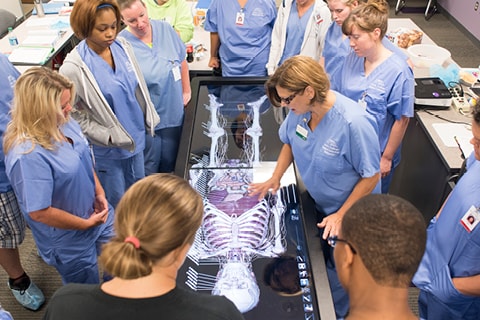Program Overview

If you want a career as a sonographer, but also have an interest in business management, this dual associate degree is for you.
With this program, you have the opportunity to earn a second associate's degree in general management at the same time as your Diagnostic Medical Sonography associate's degree. It's a great way to get that business background and increase your earning potential.
We recommend students complete the business course requirements for the dual degree before beginning clinical work as a sonography student.
About Delta's Program
-
 Amazing faculty
Amazing facultyAt Delta, you get small classes, professors who see your potential and resources to help you succeed. Delta professors are here to teach. And, they're really good at it.
- Accredited 20-month program that includes classes, labs and clinical experience
- Full-time program with required travel for clinical experience
- Degree or certificate options
- Students are eligible to take boards for RDMS certification 60 days prior to graduation
Professional licensure
National certification through the ARDMS, good in all states.
The Diagnostic Medical Sonography Program is accredited by the Commission on Accreditation of Allied Health Education Programs upon the recommendation of the Joint Review Committee on Education in Diagnostic Medical Sonography.
Commission on Accreditation of Allied Health Education Programs
9355 - 113th St. N, #7709
Seminole, FL 33775
727-210-2350
www.caahep.org
Getting your degree in the health field is unique compared to other programs. You must first take your prerequisite core courses and then apply for validation.
What's validation?
The Program Coordinator reviews your application packet and validates your prerequisite
courses and requirements to confirm you are eligible to begin the clinical portion
of your program.
Success tips
- Declare the Diagnostic Medical Sonography program.
- Meet with your advisor regularly. Stay on track with what you need to do to apply.
- Apply for validation with Program Coordinator, Kim Boldt, once you've started your final semester of prerequisite courses. You can begin requirements for your application anytime, so don't delay!
- Stay connected for important updates from Delta!
Students are accepted into the DMS Program under Option A or Option B. For both options, entry into the DMS program is through a validation process. Only students who are validated may attempt to register for DMS courses.
Validation will include:
- Meeting all admission criteria; and
- Qualifying under Option A, or obtain a "B" (3.0) grade or higher in each course for Option B. Students must have a minimum of nine (9) points to be considered.
- In addition, all students must demonstrate English competency - reading and writing - with a minimum of 76 on Accuplacer reading and 81 on Accuplacer writing prior to application.
Required admission criteria
1. Prerequisites are met under Option A or Option B.
Option A
Graduate of an accredited Allied Health Program. If you have not had college level
physics, this class must be taken and completed with a "B" (3.0) grade or higher;
Medical Radiography will meet this requirement. = 4 points
Option B
Overall GPA from BIO 140 or BIO 152 and BIO 153, HSC 105, PHY 101 or PHY 111, ENG 111, ENG 113, COM 114, or transfer
equivalents - each course must be completed with a "B" (3.0) grade or higher).
- 3.0 - 3.2 = 1 point
- 3.3 - 3.6 = 2 points
- 3.7 - 3.9 = 3 points
- 4.0 = 4 points
2. Completed Sonography Observation Report.
- 8 hours minimum = 1 point
- 16 hours or more = 2 points
3. Two professional letters of reference documenting your employability skills, such as letters from employers, supervisors of volunteer work, or professionals you have worked with. = 1 point
4. Documentation of current CPR certification = 1 point
5. In addition to the required admission criteria, the following criteria are optional ways to increase your overall point total:
- Completion of additional college courses in math or science related to the DMS field, (determined by the DMS coordinator), of equal or higher level than prerequisite courses, with a minimum "B" (3.0) grade
- Examples of courses that qualify: HSC 140, MTH 119 or higher, CHM 101, and BIO 203. = 1 point each
- Documentation of volunteer/work experience in the medical field approved by the DMS
Coordinator. This should be a letter from your employer or supervisor documenting
the hours and duties of the volunteer/work experience.
- Up to 100 hrs = 1 point
- 101 - 400 hrs = 2 points
- 401 - 1200 hrs = 3 points
- more than 1200 hrs = 4 points
- To prepare competent entry-level sonographers in the cognitive (knowledge), psychomotor (skills), and affective (behavior) learning domains for the abdominal sonography-extended concentration.
- To prepare competent entry-level sonographers in the cognitive (knowledge), psychomotor (skills), and affective (behavior) learning domains for the obstetrics and gynecology concentration.
We think it's important to know how we're doing so we can continually improve our programs – collegewide. We work really hard to give our students the best possible education. So, we annually evaluate and show you what we find out. We're happy to share results of the most recent five-year time period.
Download Delta College's diagnostic medical sonography program effectiveness data (PDF).
Motor
- Ability to stand and walk for extended periods of time (several hours)
- Ability to lift and/or support up to 50 lbs
- Ability to push heavy equipment up to 300 lbs and safely transfer and position patients weighing up to 250 lbs
- Mobility to move freely around the imaging department and ultrasound room, as well as other areas of the hospital such as surgery and patient rooms
- Ability and manual dexterity to frequently reach and handle equipment for imaging purposes
- Ability to reach up to 6 ft. off the floor
- Ability to assume varied postural positions (bending, kneeling, stretching) to work with equipment and patients
- Must have dexterity to manipulate the transducer and control panel simultaneously (with thumb/hand/wrist/arm/hand movements)
- Strong hand/eye coordination
- Ability to write legible English in a style that is readable
- Motor ability to act quickly in emergency situations
- Dexterity to work in a sterile environment, prepare sterile fields and fill sterile syringes
- Ability to think in 3-dimension while using a 2-dimensional imaging modality
Sensory/Mobility
- Ability to discern small differences between shades of gray in order to acquire and fully interpret an ultrasound image
- Distinguish between the colors red, yellow, blue and green in order to accurately interpret color Doppler
- Ability to hear patients when at a distance of 10-15 feet
- Ability to read and comprehend written orders in English
- Ability to see in very dim light
Communication
- Possess verbal and written skills to communicate effectively in English with patients and other healthcare professionals
- Ability to elicit information and assess non-verbal information
Cognitive
- Ability to read and comprehend relevant information in textbooks, medical records and professional literature
- Ability to measure, calculate, reason, analyze, integrate and synthesize in the context of the sonography profession and to make critical thinking decisions, hypotheses and conclusions
- Ability to retain and apply information
- Ability to organize and accurately perform individual steps in a sonographic procedure in proper sequence and time frame
- Ability to apply knowledge to sonographic imaging and problem solve clinical scenarios
- Use cognitive skills to identify, record and adapt procedures as appropriate to anatomical, pathological and diagnostic information and images
Behavioral/Social/Emotional
- Must possess the emotional health required for full utilization of intellectual abilities, exercise of good judgment and prompt completion of all responsibilities as relate the sonographic imaging field
- Ability to function under all circumstances including highly stressful and/or fast-paced environments
- Ability to adapt to an environment that may change rapidly without warning and/or in unpredictable ways
- Ability to show empathy, compassion, and concern for others
- Ability to remain calm and focused during performance of sonographic exams, including competency evaluation performance
- Demonstrate integrity, honesty and professionalism in all matters with peers, faculty, staff and patients
- Demonstrate accountability, problem solving, sound judgment and listening skills at all times
- Ability to maintain confidences according to professional and legal (HIPPA) standards
- Comply with the Sonographer Code of Ethics, Clinical Practice Standards and Scope of Practice. Visit the Society of Diagnostic Medical Sonography for more information.
Delta is committed to ensuring that otherwise qualified students with disabilities are given equal access through reasonable accommodations to its services, programs and activities for students with disabilities. Students with disabilities are required to perform all essential functions of the program with or without reasonable accommodation. We will work with the student and disability office to provide reasonable and appropriate accommodations. While Delta will make every effort to work with our students with disabilities to accommodate their disability-related needs, it is important to note we are not required to provide requested accommodation that would fundamentally alter the essential functions or technical standards of the program. Students can contact Disability Resources at 686-9794 or disabilityresources@delta.edu.
Why you should choose Delta
- Our graduates consistently perform well above the national average on the ARDMS certifying exams.
- High employment rates. 100% placement rates for graduates willing to relocate.
Consistent positive feedback from graduates, clinical sites and employers! Here are a few examples.
- “Your program has great credibility and grows good future sonographers.”
- “I’m so proud to be a Delta graduate.”
- “The physicians I work with are impressed with my performance, and many of them have asked me where I went to school.”

- Renovated health wing with hospital simulation
- Lab with four new machines including 3D capability
- Computerized Anatomage anatomy table
Articulation agreements for transfer and bachelor completion exist with:
- Ferris State University
- Northwood University
- Sienna Heights University
- Davenport University
Facts & Figures

Our students get the latest technology so they can graduate and be ready to hit the ground running.

Delta is nationally recognized as one of America's leading community colleges.
Related Programs
Delta College offers over 140 degree, certificate and training options. Continue exploring and advancing your education with these related programs: